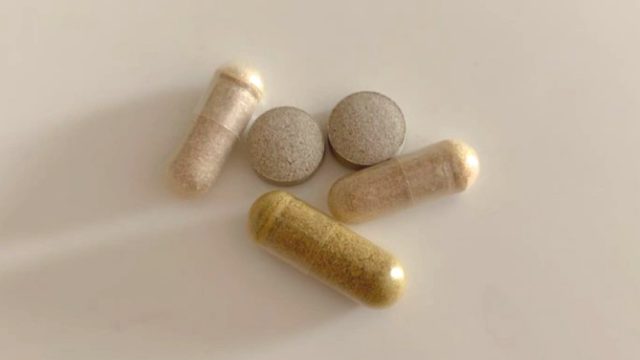The Link Between Circadian Fasting, Nutrition, and Menopause
Dr. Amy Shah on how what we eat, and when we eat, impacts our hormones.

When it comes to our biggest health and wellness concerns, a change in the way we eat is usually a good starting point. This is great for symptom relief, if not the solution to some of our woes. Not surprisingly, that credo also applies to women undergoing hormonal transitions such as menopause, often defined by symptoms such as brain fog, hot flashes, anxiety, and irritability. Nutrition expert Dr. Amy Shah is a proponent of paying attention to what we eat and when we eat it.
Timing is Everything
“The body perceives menopause as an abnormal experience, and given that circadian rhythms run about 80 percent of our genes, it’s imperative to maintain a fixed biological clock to navigate perimenopause, menopause, and postmenopause,” says Shah.
One way to sync up with that internal clock is through intermittent fasting, known as circadian fasting—something Dr. Shah practices in her own life and recommends to the clients she sees out of her clinic in Scottsdale, Ariz., and online. “Circadian fasting nurtures the engine behind comprehensive health, the gut, by following our body’s natural 24-hour cycle. This is known as circadian rhythm. It produces input for energy levels, digestion, brain-wave activity, and hormone release,” she explains. “The way to achieve this is by fasting 12 to 16 hours overnight to rest the gut, which plays a major role in hormone production and processes.” Restricting the time period during which you can eat can result in a better mood, greater sleep quality, higher energy levels, more regular digestion, improved brain function, and general relief of symptoms.
As Dr. Shah points out, circadian rhythms have also been detected in daily patterns of hot flashes. “Consider the commonality of sleep disturbance due to a reduction in melatonin in menopause. Melatonin is a hormone released in accordance with our internal clock. With circadian fasting, we improve the sleep-wake cycle and allow the body to move more easily into a state of rest,” she says.
Circadian Fasting: A to Zzzs
“The reason I always recommend circadian fasting is because it doesn’t require you to skip breakfast. Most of the hours when you are not eating are while you are asleep, which helps combat any negative side effects,” says Dr. Shah. But, as she also points out, circadian fasting isn’t recommended for everyone. “Pregnancy, a history of eating disorders, medications that conflict with fasting, ongoing development (children and young adults), certain health conditions, and diseases are a few indicators that fasting might not be right for you. It’s always best to discuss potential changes in your diet with your doctor,” says Dr. Shah.
For those who are a fit for circadian fasting, Dr. Shah recommends the following:
- Start by determining your food window (the hours you eat during the day). When choosing your window, consider your baseline stress levels. If you’re not getting enough sleep and have a lot of cortisol in your life, you should avoid doing a longer fast until that’s resolved.
- Choose hours that feel comfortable for you, and keep a desired bedtime in mind. We want to stop eating 2-3 hours before bed, so many people like to do it from 7 a.m. to 7 p.m.
- Intermittent or circadian fasting is best done when you listen to your body. The cons can usually be prevented if you provide yourself with enough nutrients during your eating window. It’s important to plan ahead when fasting. This ensures you have satisfying and balanced meals and are drinking enough fluids during the day.
- When making a plan, consider medications and if they must be taken with food.
- Most importantly, go slow and don’t throw yourself into fasting 16 hours every night. Remember that just because you don’t follow through on your plan for one day doesn’t mean the entire week needs to be thrown away. Like all things, time and repetition will help to make this your new normal. You can then lengthen the fast as this feels more doable.
The Three Ps
So, what should women in perimenopause, menopause, and postmenopause be eating? “Estrogen is tightly linked to the microbiome, and nutrition is the best way to alter that environment. The brain, hormones, energy, and mood rely on the gut to function optimally,” says the double board-certified MD. Gut bacteria depend on hormones such as estrogen and progesterone to flourish. When those hormones decline, too does the number of gut bacteria. The solution: adopting a diet that supports a population of diverse and beneficial bacteria in the gut. “I live by the three Ps: protein, plants, and probiotics. Protein will satisfy and strengthen healthy bacteria, plants will feed and fuel healthy bacteria, and probiotics will further populate the gut,” says Dr. Shah.
Nutrition as Fuel
Dr. Shah’s books include “I’m So Effing Tired” and “I’m So Effing Hungry.” She emphasizes the importance of nutrition during all stages of life, especially during hormonal transitions. New studies show that increased fiber consumption may be associated with a reduced risk of depression. Particularly, in premenopausal women… “Eating leafy greens is an excellent source of fiber and has also been shown to preserve another area of importance, cognitive ability,” says Dr. Shah, who recommends eating 25 to 35g of fiber daily.
Shah also notes that with changes in hormones, the risk for dementia rises, making women of menopausal age twice as likely to develop it. “Eating berries helps with cognition and brain circulation and will also provide antioxidants and polyphenols,” she says. Another recommendation? Omega 3 fatty acids which support brain health through their anti-inflammatory properties. Bonus: vegan algae oil supplements are a good alternative to reap these benefits if you don’t eat fatty fish. “For women in periods of hormonal change, nutrition is so powerful,” says Dr. Shah.



